Brain Surgery
Brain Tumours
A diagnosis of a brain tumour is devastating news. The team at Brisbane Clinical Neuroscience Centre (BCNC) will endeavour to support you through what we understand is a difficult journey and will focus on your emotional, as well as medical, needs. Our doctors are all experienced brain tumour surgeons in both children and adults, and we have access to the best technology available to safely and effectively perform your surgery. Dr Robert Campbell leads the brain tumour service within our practice and has significant interest in the use of technology to maximise safe tumour resection. Our practice nurses and support staff work together to support your needs to ensure your recovery is managed with care and compassion.
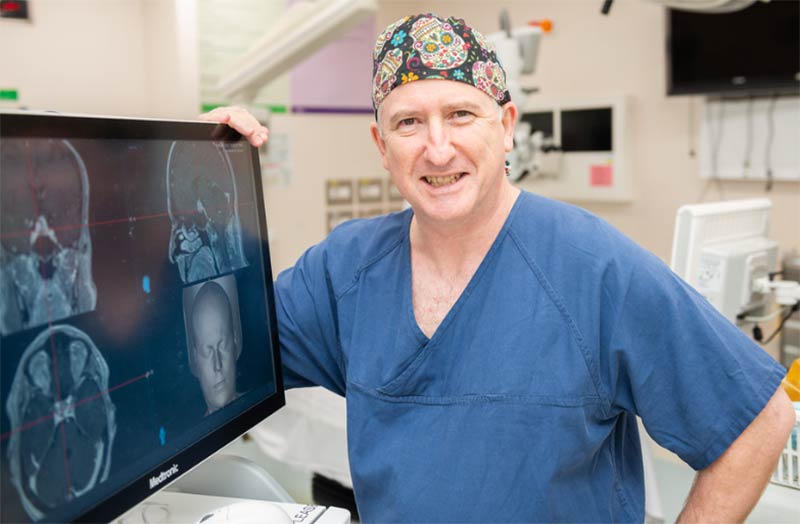
Focusing on your emotional, as well as medical, needs.
Acoustic Neuromas (Vestibular Schwannomas) and Pituitary Tumours
The management of Acoustic Neuromas and Pituitary Tumours is highly specialised and undertaken as a team approach between ENT skull base surgeons and neurosurgeons. The Brisbane Clinical Neuroscience Centre (BCNC) specialists are highly trained in the management of these conditions and our acoustic neuroma team of Dr Martin Wood, Dr Damian Amato, Dr James Bowman have all undertaken specialist training in the management of these tumours in the UK and Europe.
Our practice currently performs the greatest number of surgical procedures for acoustic neuromas in Queensland, and we are ideally placed to provide for your needs.
Dr Robert Campbell, Dr Damian Amato, Dr Jason Papacostas are all experienced pituitary tumour surgeons and all surgeries are performed using the latest endoscopic techniques to minimise surgical trauma and hasten recovery.
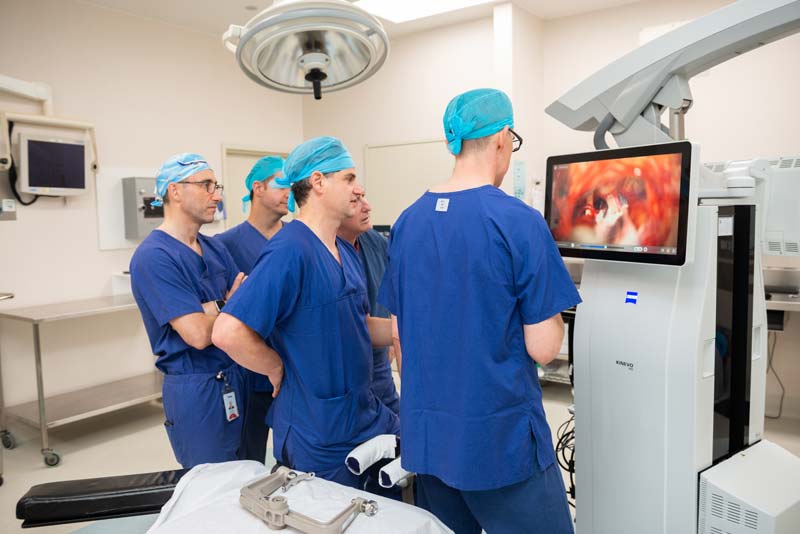
Trigeminal Neuralgia and Hemifacial Spasm
Trigeminal Neuralgia and Hemifacial Spasms are known as microvascular compression syndromes and are caused by compression of a nerve by an artery within an area of the head called the cerebellopontine angle. They are uncommon and benign conditions, but are disabling for their sufferers.
Surgery offers the prospect of cure for patients who cannot tolerate first-line therapies such as medication or (in the case of hemifacial spasm) injections. There are various surgical approaches that can help to manage these conditions, and our surgeons can provide you with all the options. Surgery in this area of the brain is complex and delicate and should only be performed by surgeons who undertake these types of procedures regularly, if you are to have the best chance of successful treatment with minimal risk of complications.
There are many similarities between the management of other diseases of the cerebellopontine angle (such as acoustic neuromas) and microvascular compression syndromes, so our surgeons have the necessary skills and experience that you need.
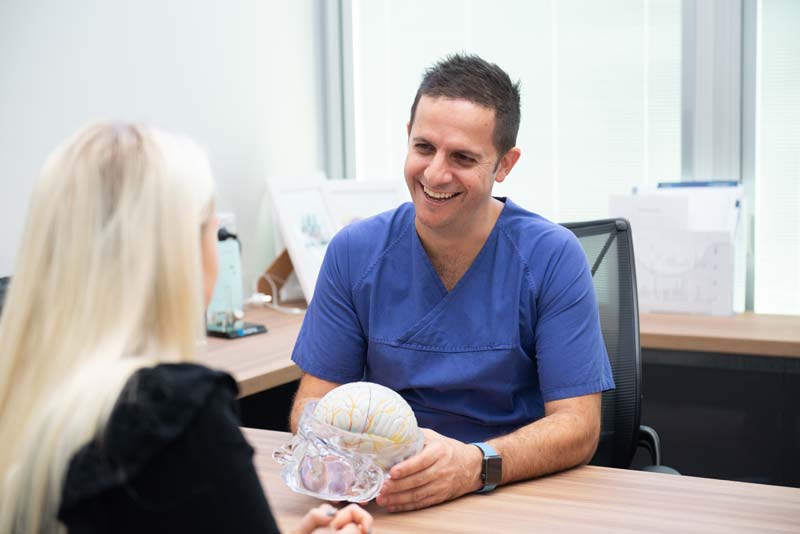
Brain Surgery for Epilepsy
Dr Jason Papacostas is the lead surgeon in the adult epilepsy surgery team at the Mater Centre for Neuroscience. This is a first-rate multidisciplinary service that provides care to large numbers of patients with epilepsy that is difficult to manage, and many of these people may actually be helped with surgery to reduce or cure their seizures.
Dr Jason Papacostas undertook specialist training in epilepsy surgery in Calgary, Canada and works closely with a team of internationally-renowned, dedicated epileptologists. Dr Martin Wood and Dr Robert Campbell are experienced in the surgical care of children with epilepsy, and both work at Queensland Children’s Hospital and Mater Children’s Private, Brisbane.
Spine Surgery
The care of spinal disorders is an increasingly complex field, and great advances have been made in the surgical management of these problems over the last decade. In particular, the development of minimally invasive or ‘keyhole’ surgical techniques and the use of the intraoperative imaging and computer guidance have revolutionised the surgical care of patients with spinal disorders. All of these advances have led to reduced operating times for patients, a reduction in post-operative pain, and a more rapid return to normal work and leisure activities following surgery.

Cutting edge technology to facilitate minimally invasive spinal surgery.
Our surgeons have been at the forefront of the adoption of minimally invasive spinal surgery techniques in Australia. They have been leaders in the publication of research papers and in teaching of other surgeons, and we believe that the results that we obtain for our patients are second to none.
Dr Tony Tsahtsarlis undertook a dedicated spinal surgery fellowship in Canada before returning to BCNC, and has provided considerable additional expertise to our group in the management of complex spinal disorders, as well as his skills in general cranial and spinal surgery.
Mater Private Hospital, Brisbane has led the way in the provision of cutting edge technology to facilitate minimally invasive spinal surgery, and it has become a hub for the teaching of surgeons from around the Asia-Pacific region.
Our surgeons are mindful of the need for a multidisciplinary, team approach to the management of spinal disorders, and we work closely with our physiotherapy and rehabilitation associates to provide for your needs.
In addition, we consider all alternatives to surgery that might benefit you, and can provide all the care that you require, surgical and non-surgical, through our practice.
Common spinal surgery procedures include:
- Cervical discectomy (fusion and disc replacement arthroplasty)
- Lumbar disc replacement
- Lumbar discectomy (minimally invasive and open), including day-case surgery
- Lumbar fusion (minimally invasive and open)
- Lumbar decompression for canal stenosis (minimally invasive and open)
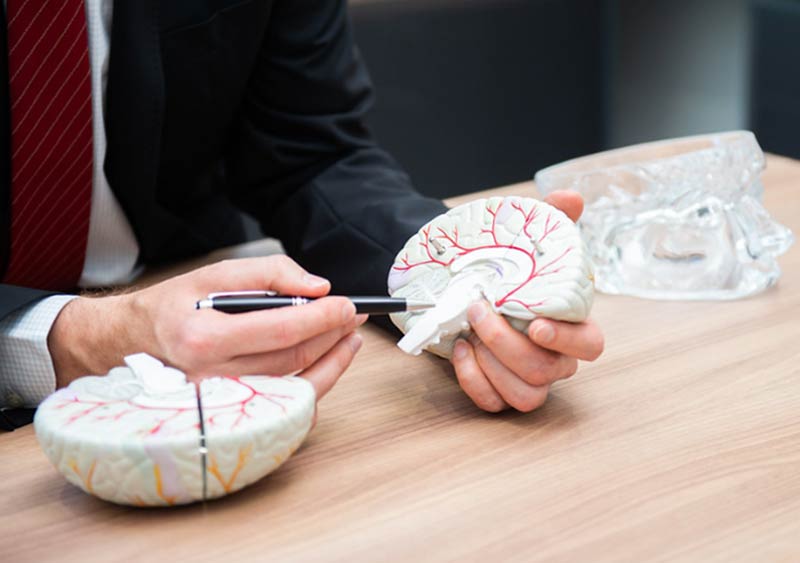
Peripheral Nerve Surgery
Peripheral Nerve Surgery treats peripheral nerve injuries, tumours and other disorders affecting the complex system of nerves that link the brain and spinal cord to other parts of the body.
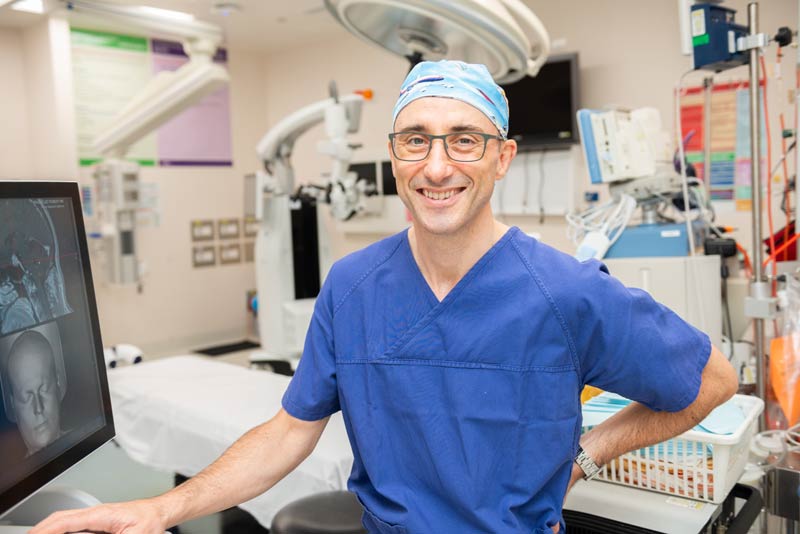
Paediatric Neurosurgery
Dr Robert Campbell and Dr Martin Wood are experienced paediatric neurosurgeons, and both undertook training in Europe to hone their skills in this field of neurosurgery. Together they have provided care to children across the broad spectrum of neurosurgical disorders for the last decade at both the Royal Children’s and Mater Children’s Hospitals, and now Queensland Children’s Hospital in Brisbane. We can look after your child with the care and compassion they deserve, whatever the problem. We can facilitate care at Mater Children’s Private Brisbane or at Queensland Children’s Hospital, according to your wishes and the needs of your child.
Looking after your child with the care and compassion they deserve.
Common paediatric neurosurgery procedures include:
- Craniofacial
- Brain tumours
- Hydrocephalus
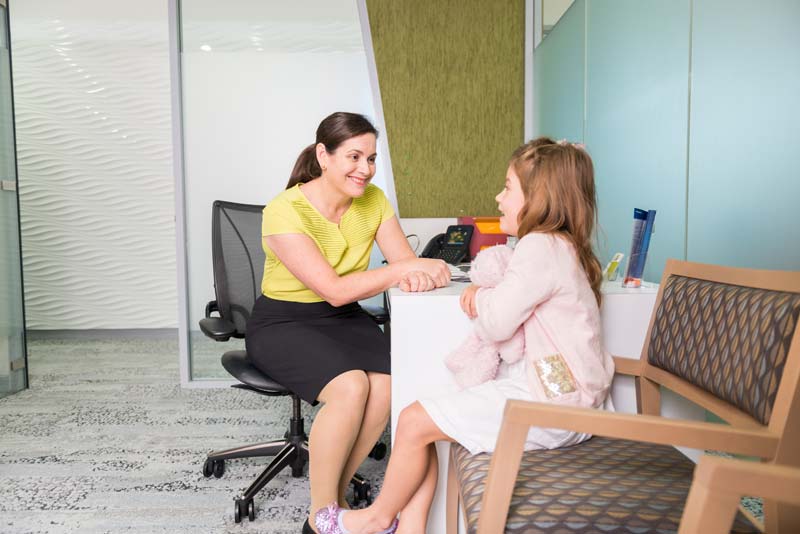
After-hours emergency care
Mater Private Emergency Care Centre is our centre of choice as they are an independent fee-for service emergency centre run by experienced emergency medical practitioners and qualified emergency nursing staff.
We are dedicated to providing high quality healthcare services 24 hours a day, seven days a week and 95 per cent of patients receive treatment within 30 minutes.
The centre is fully equipped to triage all paediatric and adult patients with access to onsite specialists, X-ray, pathology and if necessary admission to hospital for further tests or a procedure in theatre.
